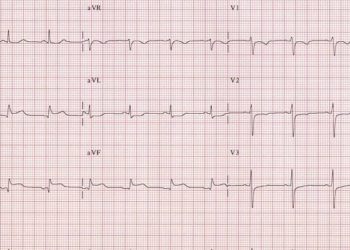Improved long-term survival with resynchronization versus defibrillation for heart failure
1. In this randomized controlled trial, the incidence of death was lower in heart failure patients who received cardiac-resynchronization therapy (CRT) versus those who received implantable cardioverter-defibrillators (ICD).
2. The time until death was longer in patients who received cardiac-resynchronization therapy than those who received implantable cardioverter-defibrillators.
Evidence Rating Level: 1 (Excellent)
Study Rundown: CRT with biventricular pacing has been an effective adjunctive therapy to medical management in patients with advanced symptomatic heart failure, reduced ejection fraction, and an intraventricular conduction delay (wide QRS complex). It has improved cardiac performance and overall clinical outcomes, leading to reverse remodeling and a reduction in new-onset ventricular arrhythmias. The Resynchronization-Defibrillation for Ambulatory Heart Failure Trial (RAFT) from 2010 demonstrated a greater benefit with respect to mortality at five years in patients who received CRT compared to those who received ICD. This follow-up trial investigated the long-term effects of CRT on mortality by analyzing the survival outcomes of patients at the eight participating sites with the largest enrollment. Overall, the study showed increased survival benefit in patients who received a CRT defibrillator (CRT-D) compared to those who received an ICD, with the CRT-D group exhibiting a lower incidence of death and longer time until death. The generalizability of the study’s findings is limited by its relatively low enrollment of women and the lack of racial diversity in its trial population. Moreover, the role of CRT on survival for patients treated with neprilysin inhibitors and sodium-glucose cotransporter two inhibitors is uncertain, given these agents were not part of the standard pharmacologic management during the original trial.
Click here to read the study in NEJM
In-Depth [randomized controlled trial]: This study was a follow-up to RAFT, a double-blind, randomized, controlled trial investigating the mortality benefit of CRT versus ICD in heart failure patients. This follow-up trial explored the effect of CRT on long-term survival. Patients with New York Heart Association (NYHA) class II or III heart failure, a left ventricular ejection fraction of 30% or less, and a QRS interval of 120 msec or greater (or a paced QRS interval of 200 msec or greater) were enrolled in the original trial and randomly assigned in a 1:1 ratio to receive an ICD with CRT (CRT-D) or an ICD only. Of a total of 1,798 patients enrolled in RAFT, 1,050 patients from eight centers were enrolled in the long-term follow-up. The median duration of follow-up for these patients was 7.7 years (interquartile range, 3.9 to 12.8), and the median duration of follow-up for those who survived until the trial end date of December 31, 2021, was 13.9 years (interquartile range, 12.8 to 15.7). The primary outcome, which was death from any cause, occurred in 370 of 520 patients (71.2%) in the CRT-D group and 405 of 530 patients (76.4%) in the ICD group. The time until death was also longer in the CRT-D group (acceleration factor, 0.80; 95% Confidence Interval [CI], 0.69 to 0.92; p=0.002). The secondary outcome, which was a composite of death from any cause, heart transplantation, or implantation of a ventricular assist device, occurred in 392 patients (75.4%) in the CRT-D group and 412 patients (77.7%) in the ICD group. In summary, this follow-up trial demonstrated the long-term survival benefit of CRT-D over ICD among patients with NYHA class II or III heart failure, a reduced ejection fraction, and a wide QRS complex, sustained during a median of nearly 14 years of follow-up.
Image: PD
©2024 2 Minute Medicine, Inc. All rights reserved. No works may be reproduced without expressed written consent from 2 Minute Medicine, Inc. Inquire about licensing here. No article should be construed as medical advice and is not intended as such by the authors or by 2 Minute Medicine, Inc.








